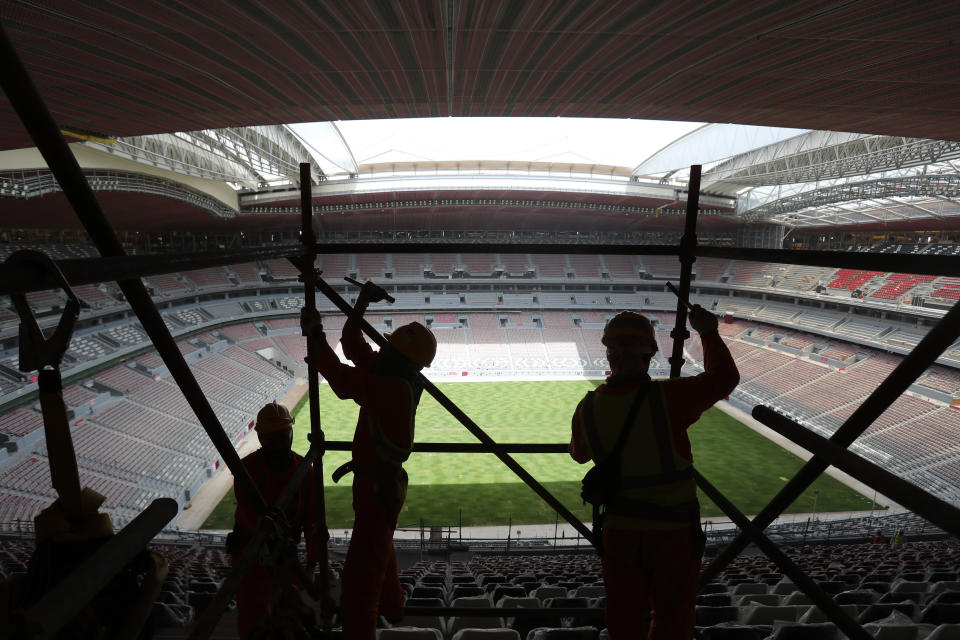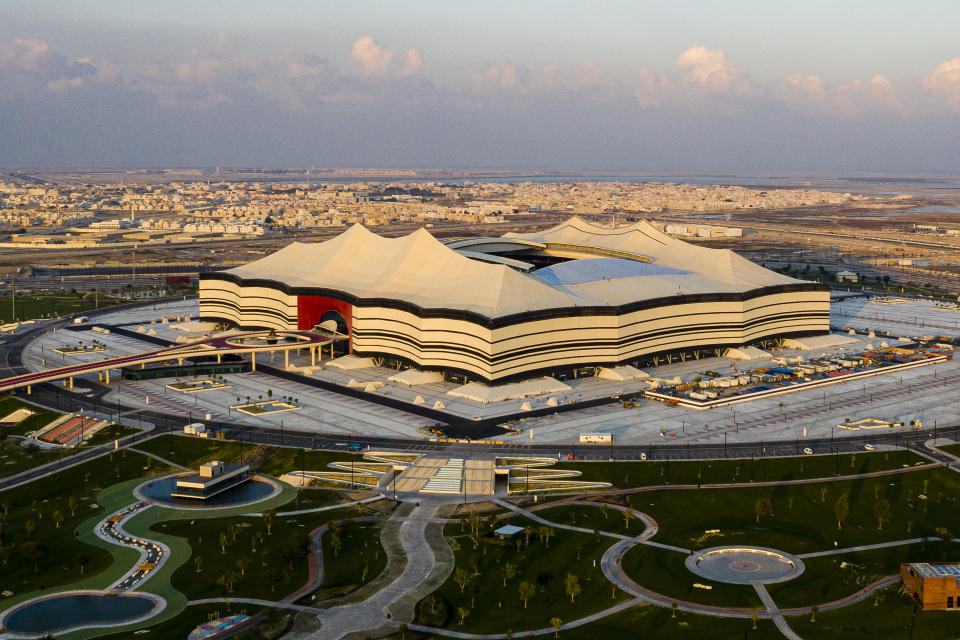Quasi-slavery is building Qatar's 2022 World Cup stadiums, and FIFA is fine with it

FIFA will make billions of dollars off the 2022 World Cup in Qatar. The 2022 World Cup in Qatar, meanwhile, is being built by workers making around $1 or $2 per hour — and, in some cases, not being paid at all.
That’s the main takeaway from a new Amnesty International report detailing labor abuses in the Gulf emirate. Workers at Al Bayt Stadium, a proposed semifinal host, went seven months without pay, according to Amnesty.
Qatari institutions have been exploiting migrant workers for years. That World Cup stadiums are being constructed using something bordering slave labor is not groundbreaking news. The Amnesty report shows that, despite promises of reform, the exploitation continues. And the entire operation, of course, has FIFA’s blessing.
How Qatar’s migrant workers are exploited
Qatar bribed its way to World Cup hosting rights in 2010. It had 12 years to turn deserts into state-of-the-art cities and futuristic stadiums. It had plenty of money with which to build — hundreds of billions of dollars. It just needed humans to do the building.
So it turned to some of the poorest places on earth — to countries like Nepal and India and Bangladesh, and others in Southeast Asia and Africa — to find those humans. They fuel the “kafala system,” a quintessential exploitative scheme that the government has pledged to dismantle but persists nonetheless. Recruiters seek out unemployed foreigners who need work to feed families. They promise relatively well-paying jobs in Qatar. The unemployed foreigners, envisioning stable wages they can send home, take out loans and make often-illegal payments to the recruiters. In return, they claim one of these coveted jobs abroad.
But in doing so, they essentially sign their life away to Qatari companies. The companies all but own them, which is why experts have likened the system to slavery. The migrants live in cramped, filthy labor camps. They can’t leave for another job or go home without permission from authorities.
They are paid, reportedly some $200 or $300 a month — unless their owners don’t feel like paying them, in which case they have little recourse.
Amnesty investigated one company, Qatar Meta Coats (QMC), which stopped paying workers last September. Workers complained and protested and tried legal challenges. They received “empty promises” and retaliation and no money until March. Payments are still far behind. After being confronted by Amnesty, QMC admitted its failures, citing “severe financial issues.”
FIFA and Qatar, the beneficiaries of this construction, each have billions of dollars in reserve. One worker interviewed by Amnesty, meanwhile, won’t be able to send his son to school. Another was unable to support a sick father back home. Some haven’t been able to pay back loans. One told Amnesty:
“We don’t have salary, we don’t have money to go to court, so we have to ask friends, we have to beg. Only God knows what is going on. We are suffering. Now our family is calling us for money. They say we should come back because they don’t want us to suffer.
“Some of the companies, they are not sticking to the rules. What I want to say to Qatar is: the rules are not working. We are all human beings. If God helps you to be in the position you are in, it doesn’t mean you should let people suffer.”

FIFA and other World Cup authorities are complicit
Qatar’s “Supreme Committee,” the 2022 World Cup organizing committee tied to both the government and FIFA, learned of QMC’s problems last summer. It told Amnesty it’s been working “to find a solution for the affected workers” since. But only after Amnesty took its findings to Qatari authorities last month did some — not all — of the missing payments begin to arrive.
Qatar, it is clear, could pay workers decently. It owns the highest GDP per capita in the world, and a 12-figure sovereign wealth fund. FIFA could help, too. Doing so would have negligible, unnoticeable impacts on their bottom lines.
But why treat human beings well when you can treat them poorly without consequence? That, essentially, is the disgusting stance Qatar and FIFA have adopted. FIFA could use World Cup-related leverage to push for human rights reforms. It chooses not to. Qatari institutions could treat their laborers humanely. They choose not to. FIFA and the organizing committee published a progressive “Sustainability Strategy” in January. It trumpets positive steps. They’ve come years too late.
“Since awarding the 2022 World Cup to Qatar nearly ten years ago, FIFA has failed to take its own clear, concrete action to prevent human rights abuses of workers on World Cup-related projects,” Amnesty wrote. “It is using the Supreme Committee’s systems as an excuse for its own inaction, allowing it to simply pay lip service to the remediation of human rights violations and to allow them to continue with impunity.”
Hundreds of workers, if not thousands, died last decade. Thousands more were deprived of humanity. More will be between now and November 2022.
Oh well, FIFA will say. As long long as a sparkling soccer tournament happens two years from now, death and quasi-slavery are fine. As long as we can make our billions.
More from Yahoo Sports:

